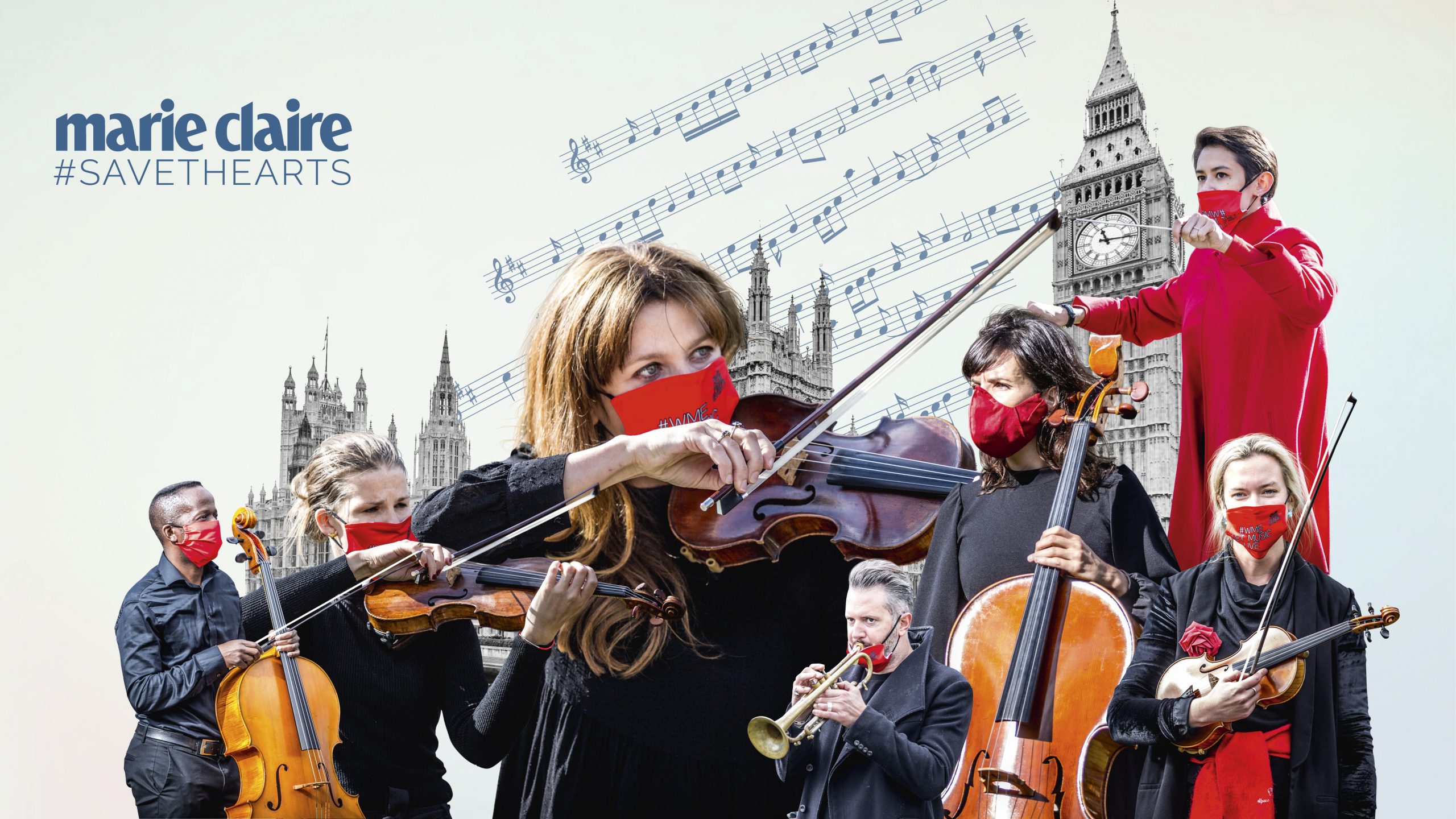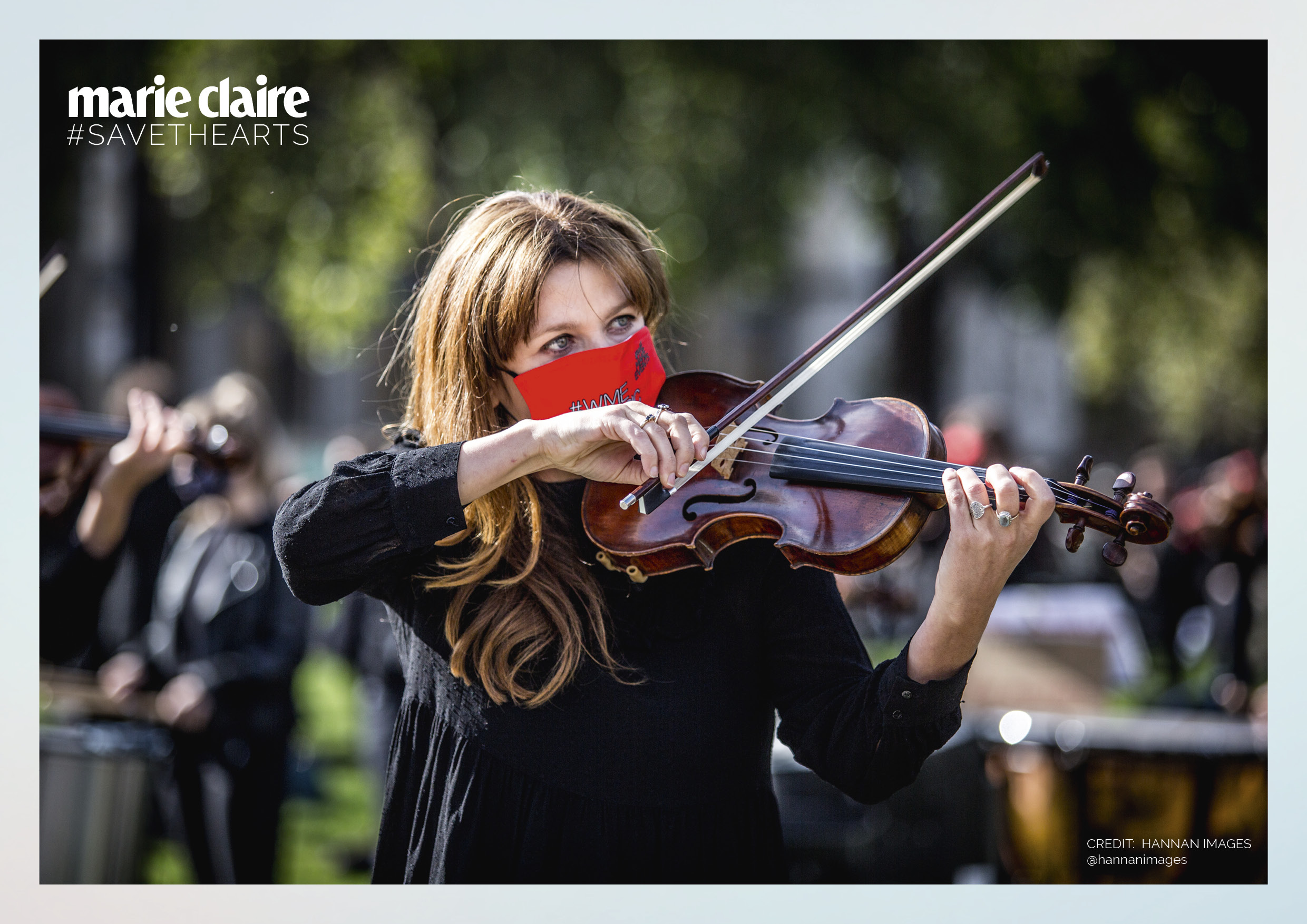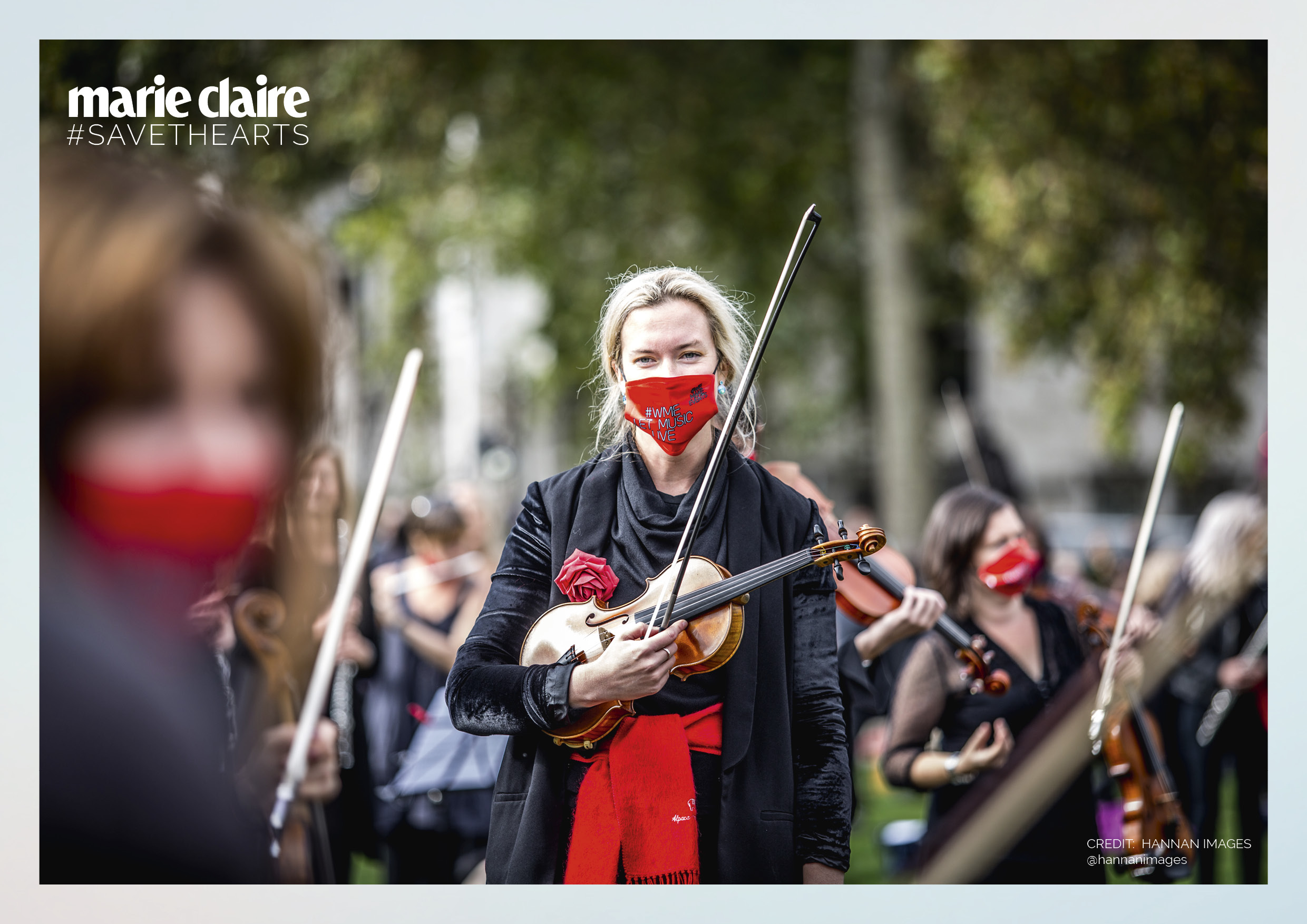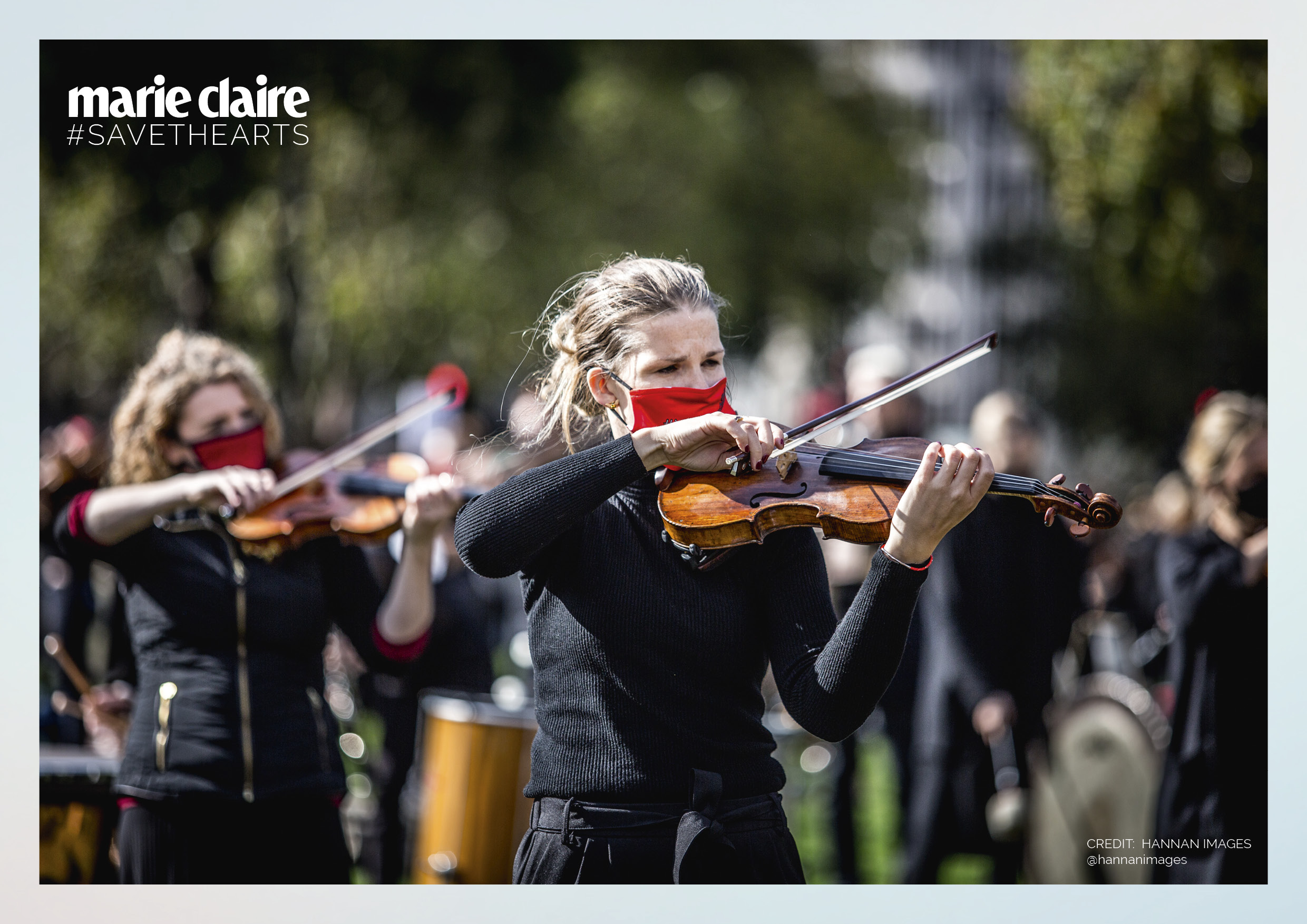#savethearts Jess Murphy: 'We organised a live music protest outside Parliament'


Celebrity news, beauty, fashion advice, and fascinating features, delivered straight to your inbox!
You are now subscribed
Your newsletter sign-up was successful
Violinist and actor Jess Murphy is one of the creatives that made the magic happen on Marie Claire's Francesca Hayward campaign shoot. She's also played with Kasabian and ELO, but this October she took part in her most important gig of all – playing outside Parliament with 400 protesting musicians. As part of Marie Claire's #savethearts campaign, she explains why Let Music Live means so much
As for so many of us who work in the arts, every single gig I had was cancelled. I had a baby in January, so I’d not been expecting to work until the end of May, but I had many festival dates booked over the summer with Sophie Ellis-Bextor and was looking forward to a European tour with ELO in the early autumn. I'm also an actor, primarily in theatre and, obviously, all that work disappeared too. I have only had four ‘gigs’ so far this year; a very small birthday party in a garden, a wedding with four guests and two filmed performances for streaming with no live audience.
Making it clear that the arts matter
By October, it became obvious restrictions for live performance were not lifting and we were heading for another lockdown with very little support for freelancers. I couldn’t take it lying down and I wanted to stand outside the Houses of Parliament and play Stravinsky's Rite Of Spring en masse. I wanted to find a way to show that we were still here, we were viable, professional and what we do when we come together is meaningful and worthwhile.

I was watching the creative industries collapse. It's been hard feeling like our jobs and freelancing in particular, seems misunderstood. Hairdressers, beauticians and restaurants had clear guidelines and support to keep working, but theatre, music and live events, professions that take 15-20 years of training seemed to be considered “unviable”.
Inspiring Let Music Live protests
It was important to me to show music, and indeed all jobs in the creative industries, were legitimate and highly-skilled professions. I posted on Facebook, “who’s in?” and a few days later the Facebook group had over 2000 members (due to Covid restrictions, we eventually had to limit performers to 400). So on October 6, we gathered in Parliament Square, where violinist Clare Raybould, came up with an ingenious grid system ensuring social distancing was perfectly observed, and we could still hear each other well enough to play together.

We named the event Let Music Live and, collectively, decided to play the opening of Mars from Holst’s The Planets – it, serendipitously, turned out that October 6 was also the day of a Mars ‘close approach’ and it will not be that close to Earth again for 22 years. Four hundred of us played and it was incredibly moving coming together as an ‘orchestra’. We made the national news on all channels and trended above the Conservative Annual Conference. There was also a simultaneous performance/demo in Centenery Square, Birmingham, organised by violinists Chloe Millar and Amy Thomas.
Our week of demos
The protest was the result of an incredible effort by colleagues, day and night, and the wonderful people at We Make Events took us under their banner and offered invaluable experience. Classical violinists Nicola Benedetti, Tasmin Little and clarinettist Emma Johnson also offered their amazing support and the Benedetti Foundation sponsored 200 red masks for us to wear. A few weeks after the event, We Make Events decided to organise a full week of demonstrations with each day dedicated to a different profession. Let Music Live organised participants from ballet and opera, and actress and musical theatre star Rosalie Craig and I volunteered to help organise the theatre demo.
Celebrity news, beauty, fashion advice, and fascinating features, delivered straight to your inbox!
We're hoping to continue shining a light on those who have been excluded entirely from any support. Over a third of those in the music and theatre professions are ineligible for any support from the Self-Employment Income Support Scheme. I am lucky enough to be booked for Sophie Ellis Bextor’s Kitchen Disco tour in May 2021, based on her wonderful Kitchen Disco live streams during the first lockdown, so I’m very much hoping that it will go ahead. With Let Music Live we are hoping to organise an outdoor socially-distanced benefit concert for those struggling financially and find ways of supporting our fellow musicians’ mental health at this time.

So many venues have closed for good
It’s been very hard to watch the intricate fabric of the freelance world disappearing. So many beautiful venues have closed for good. So many friends and family have had to move abroad permanently to work. So many are working (gratefully) in other jobs but there are also those thinking they may not be able to return to music. The oft quoted £1.57 billion pledged by the government was a huge sum, but it's earmarked to keep large buildings and institutions going. Those working in them and smaller grassroots venues feeding these larger institutions are going under. The creative industries shut down first, before lockdown, and it seems they will be the very last to re-open.
Personally, the complete loss of work is a huge financial struggle, but not the only impact. Not to work for so long has been very strange and soul destroying. It’s a loss of human connection, both for fellow performers and the wonderful audiences. The loss of being part of a shared experience, is what I have felt most keenly, more than I thought possible.
We must survive
We need to take steps to ensure the arts can recover, that those who have had to leave the profession are given enough support to survive and return to it. I wish that those working in the arts could be viewed as like those in extremely hardworking small businesses worthy of respect and investment like sport, hairdressing and personal care.
Its time the UK recognised the arts as something we're genuinely brilliant at. The hundreds of thousands of self-employed freelancers, whether they be on stage or behind the scenes are hugely important. Sound engineers, actors, MD’s, musicians, electricians, wig makers, costume designers, front of house, directors… we're all part of an intricate network which makes the destination point of any show, or event, happen. And it fuels the economy to the tune of £10.8 billion a year. We can be part of the national recovery, if we are allowed to survive.
* Follow Let Music Live on Instagram @letmusicliveuk * Get involved with our Save The Arts campaign this week via our social media platforms @marieclaireuk #savethearts
Maria Coole is a contributing editor on Marie Claire.
Hello Marie Claire readers – you have reached your daily destination. I really hope you’re enjoying our reads and I'm very interested to know what you shared, liked and didn’t like (gah, it happens) by emailing me at: maria.coole@freelance.ti-media.com
But if you fancy finding out who you’re venting to then let me tell you I’m the one on the team that remembers the Spice Girls the first time round. I confidently predicted they’d be a one-hit wonder in the pages of Bliss magazine where I was deputy editor through the second half of the 90s. Having soundly killed any career ambitions in music journalism I’ve managed to keep myself in glow-boosting moisturisers and theatre tickets with a centuries-spanning career in journalism.
Yes, predating t’internet, when 'I’ll fax you' was grunted down a phone with a cord attached to it; when Glastonbury was still accessible by casually going under or over a flimsy fence; when gatecrashing a Foo Fighters aftershow party was easy-peasy-lemon-squeezy and tapping Dave Grohl on the shoulder was... oh sorry I like to ramble.
Originally born and bred in that there Welsh seaside town kindly given a new lease of life by Gavin & Stacey, I started out as a junior writer for the Girl Guides and eventually earned enough Brownie points to move on and have a blast as deputy editor of Bliss, New Woman and editor of People newspaper magazine. I was on the launch team of Look in 2007 - where I stuck around as deputy editor and acting editor for almost ten years - shaping a magazine and website at the forefront of body positivity, mental wellbeing and empowering features. More recently, I’ve been Closer executive editor, assistant editor at the Financial Times’s How To Spend It (yes thanks, no probs with that life skill) and now I’m making my inner fangirl’s dream come true by working on this agenda-setting brand, the one that inspired me to become a journalist when Marie Claire launched back in 1988.
I’m a theatre addict, lover of Marvel franchises, most hard cheeses, all types of trees, half-price Itsu, cats, Dr Who, cherry tomatoes, Curly-Wurly, cats, blueberries, cats, boiled eggs, cats, maxi dresses, cats, Adidas shelltops, cats and their kittens. I’ve never knowingly operated any household white goods and once served Ripples as a main course. And finally, always remember what the late great Nora Ephron said, ‘Everything is copy.’
